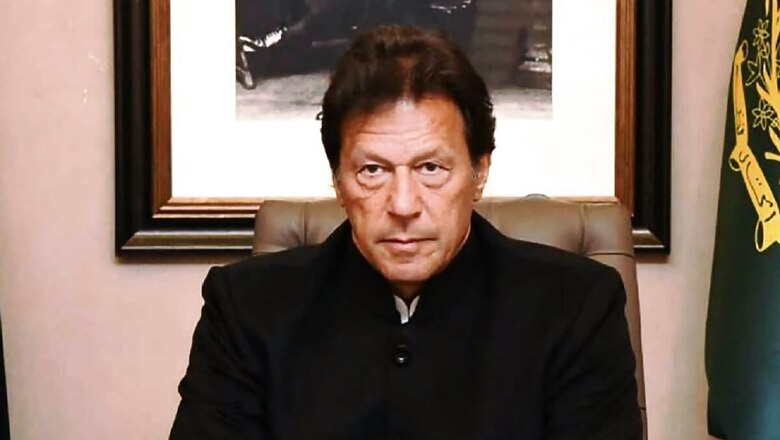
views
It so happens that religious intolerance in Pakistan has become second nature to the political and spiritual psyche of the government and the pubic alike. The controversy over the allegedly ‘blasphemous’ sketches published by the French magazine, Charlie Hebdo, has brought about a series of violent protests in major cities of Pakistan and Imran Khan government seems to have been bullied into accepting certain demands by the far right religious parties.
The sit-in by Tehreek e Labbaik (TLP) Pakistan back in November 2020, which blocked entry point into the capital city of Islamabad at Faizabad junction, ended only after the Imran Khan government signed a written agreement giving into their demands of the TLP one of which was to expel the French ambassador and severing diplomatic ties with France. Although at the time the government succeeded in winning the day, however, it proved to be futile as the deadline of February 17 to honour the deal approached. The deadline was extended to April 20.
On April 12, TLP leader Saad Rizvi was suddenly arrested. Rizvi’s arrest came only after he had announced to lead a protest march toward Islamabad. The purpose was to force the government to execute the promise it had made to expel the French ambassador before April 20.
Rizvi’s arrest led to wide spread riots across all major cities in Pakistan. Eleven police men including a ranger officer were taken hostage by the TLP and kept inside the compound of Rehmat ullil Alameen mosque in Lahore.
Meanwhile several hundred arrests were made and more than a dozen people and at least 4 police men lost their lives during the violence that lasted for over a week. Finally, so it seemed, the interior minister announced that the government had reached an agreement with the leader of TLP and as a result of which the government was now bound to table a resolution in the parliament to carryout debate on the demands that TLP has raised regarding the expulsion of the French ambassador.
But the ferocity with which the far-right religious party of TLP had demonstrated its street power sent shock waves not only across French establishment but to a wider European polity. It enforced the argument that Pakistan had failed the task to dismantle far-right Jihadi outfits.
It is in the background of the above mentioned intimidating scenario that European Union has rallied behind France and in the spirit of not bowing down to ‘blasphemy accusations’ in Pakistan that on Friday, April 30, the EU parliament adopted a resolution calling for a review of the GSP-Plus status that was granted to Pakistan in 2014.
GSP-Plus or Generalised Scheme of Preferences aims at helping economies of vulnerable developing countries by cutting down or completely wavering duties on imports coming into the EU. Between 2014 and 2016 Pakistan’s exports to the EU countries had increased by a whopping 30%. (1).
According to Joint Staff Working Document published by European Commission on February 22, 2020, “The EU is Pakistan’s first export destination absorbing over a third (34%) of Pakistan’s total exports to the world in 2018…The EU (was) Pakistan’s third largest source of imports in 2018.” (2)
This means that by losing GSP-Plus status Pakistan will no longer be able to enjoy duty free facility for exports to the EU. If that happens then apparel and textile industry in Pakistan will suffer an annual loss of around Rs. 1 trillion. (3)
Textile production in industrial cities in Pakistan such as Faisalabad will come to an abrupt halt. Most of the 500 odd factories (4) in the city of Faisalabad alone will have to close down. This will result in massive unemployment and destitute and loss of much needed revenue.
The share of textile in total exports of Pakistan is 50% hence textile’s share in Pakistan’s GDP is at least 23%. The textile sector employs around 40% of the total industrial force of Pakistan and textile industry alone consumes between 36% to 40% of total bank loans in Pakistan. (5)
If Pakistan loses its GSP-Plus status it will not only effect the textile industry but will also have a domino effect hastening the collapse of the banking sector followed by bankruptcy of real estate and transport industry.
GSP-Plus resolution adopted at the EU parliament to review Pakistan’s status should act as a wakeup call for Pakistan. Nurturing, harbouring as well as exporting terrorism has cost Pakistan, her people and the region dearly. It is about time that Pakistan totally disassociates herself with all sects and brands of terrorist outfits, dismantle all jihadi training camps and launch a decisive crackdown on the far-right religious organisations.
Dr Amjad Ayub Mirza is an author and a human rights activist from Mirpur in PoJK. He currently lives in exile in the UK.
—————-
(1) https://ec.europa.eu/transparency/regdoc/rep/10102/2020/EN/SWD-2020-22-F1-EN-MAIN-PART-1.PDF
(2) Ibid.
(3) https://www.econstor.eu/bitstream/10419/108384/1/179-548-1-PB.pdf
(4) https://www.punjab.gov.pk/faisalabad_industry 5 https://www.ilo.org/wcmsp
(5)/groups/public/—asia/—ro-bangkok/—ilo islamabad/documents/publication/wcms_245786.pdf
Read all the Latest News, Breaking News and Coronavirus News here. Follow us on Facebook, Twitter and Telegram.



















Comments
0 comment